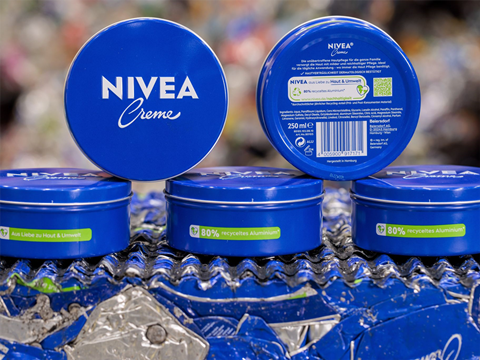
Beiersdorf has incorporated a minimum of 80% recycled aluminium into its NIVEA Creme tin – a move expected to cut around 8,000 tons of carbon dioxide equivalent (CO2e) emissions from the company’s operations between now and 2025.
In a Q&A, Isabell Niggeman, Procurement, stated that Beiersdorf’s use of recycled material is “lowering CO2e emissions massively”, claiming that the production of recycled aluminium is 95% less energy-intensive than that of virgin aluminium.
“This important change was possible through an intense collaboration with our supplier and long-term partner, Novelis,” she said. “It has been my role as procurement to align our sustainability approach with our supplier and develop together with R&D the new packaging and feedstock.”
The transition into recycled aluminium coincides with Beiersdorf’s CARE BEYOND SKIN Sustainability Agenda. The company intends to reach net zero by 2045 and, in order to reach that goal, is taking steps to lower its environmental footprint across the value chain.
According to Niggeman, Beiersdorf reached an absolute CO2e emission reduction of 19% by the end of 2023 compared to 2018 – yet the company is still targeting a 30% reduction by 2025, and the new NIVEA Crème tin is expected to reduce around 8,000 tons of CO2e emissions within that time frame.
When asked why the pack does not contain 100% recycled aluminium, Philip Helm, Packaging, explained: “One of the highest barriers for the use of recycled aluminium is the availability of the recycled material. We must be able to ensure a steady process at the supplier and in our own production centre here in Hamburg. But yes, I can imagine achieving 100% recycled aluminium in the future, as we will continue to work on the topic of sustainability, also together with our suppliers.
“When sorted adequately and put to recycling, aluminium can stay in the material cycle almost infinitely without a meaningful degradation of properties and quality. Therefore, aluminium is really the ideal packaging material for a circular economy.”
Holger Dede, Beiersdorf Manufacturing Hamburg, also listed the roadblocks faced during the new tin’s development:
“Besides the challenge of the availability of recycled aluminium in the quantities we need for a product we sell globally, it has been a challenge to identify the right alloy that fits into our machines and processes in the factory. It’s been a trial-and-error phase of testing that took several months until we found the best fit and adapted our processes to the new material.
“Next to this challenge, it was also a bit tricky to get the green claim printed on the tin in the right format. Prior to the relaunch, our NIVEA Creme tin had the same look around the globe, but now, we wanted to have the “80% recycled aluminum” message printed on the side of the tin.
“Our processes are set in the way that we print the colour onto the aluminium sheets first and then press the aluminium into the tin shape. So, the layout of the printing needed very precise adjustments, so that the claim stood in a horizontal design. Imagine this for the many different markets we sell the NIVEA Creme and the languages this requires, we were quite busy with this.”
“The improved sustainability of the packaging is very well received by our consumers,” added Morgane Deleuze, Marketing. “Who would not like to see their favourite skin care product being transformed into a better version of itself?
“It is a proof point for our approach at Beiersdorf and at NIVEA: we want to deliver impact at scale, so we implement sustainability aspects with our global bestsellers. This allows millions of consumers around the globe to stick to their well-known and trusted skin care routines and reduce their carbon footprint at the same time.”
A statement posted on LinkedIn by Novelis Europe EVP and president Emilio Braghi reads: “This is a proud moment for Novelis and a major milestone on our journey together with one of our longstanding customers towards circularity and sustainability: The world-famous blue tin of NIVEA Creme is now made from 80% recycled aluminium.
“This innovative and sustainable packaging was created with strong research and development units of both our companies, Novelis and Beiersdorf, led by the common goal of achieving ambitious sustainability targets.
“This collaboration is an outstanding example of our commitment to drive high-recycled packaging solutions and foster responsible practices. The new 80% recycled aluminium tin reduces the environmental footprint and ensures that beloved products like Nivea’s lead the change towards a more sustainable world.
“Together, we are already working on the next, even more circular solution. Stay tuned!”
Last year’s CO2 reduction efforts from Beiersdorf included incorporating 50% recycled material into the blue caps and yellow trigger pumps of its Protect & Moisture product, and such changes to its NIVEA Lip Care assortment as replacing its plastic blister pack with a folding box. The company stated its intent to lower emissions by 30% by 2025.
More recently, Tubex won a German Packaging Award for its refillable aluminium deodorant spray cans, made from 100% recycled material. It propellant uses compressed air instead of conventional mixtures of propane and butane – an effort set to reduce its greenhouse gas emissions.
Tubex also received etma’s Tube of the Year 2024 Award in the aluminium category, having supplied Chanel with its Blue Tube Evo design. Containing 95% post-consumer recycled content, it is believed to be infinitely recyclable and reduce carbon emissions ‘significantly’.
If you liked this story, you might also enjoy:
How are the top brands progressing on packaging sustainability?
Sustainable Innovation Report 2024: Current trends and future priorities
Reuse vs. single use – which is better for the environment?
The ultimate guide to global plastic sustainability regulation













No comments yet